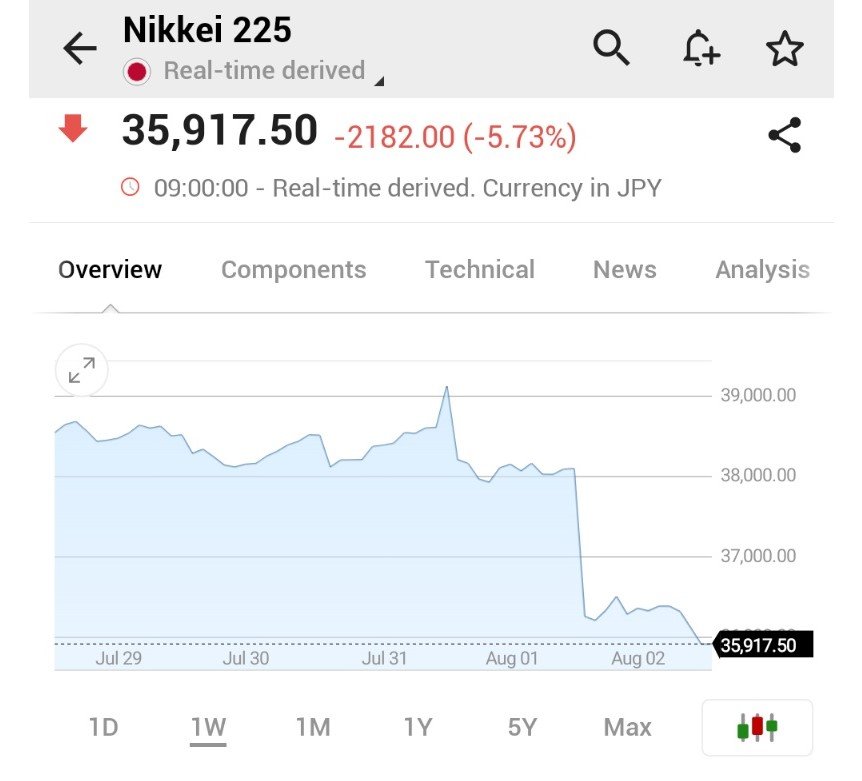Hong Kong, 2 August 2024 (TDI): Fears over the US economy and traders’ anticipation of additional hikes in interest rates from the Bank of Japan caused Japan’s stock market to fall sharply on the last trading day of the week.
The Nikkei 225 saw its largest daily decline since March 2020 at the close, down 5.8%. It prolonged a sell-off in world stocks that started with the revelation of bleak US economic data. The Japanese benchmark closed at its lowest point since January after losing 2.5 percent on Thursday.
Friday’s opening was also weaker on the European front. Benchmark Stoxx Europe 600 index saw a 1.4% decline. The DAX in Germany and the CAC 40 in France both experienced 1.2% and 0.6% declines. The bank-heavy FTSE 100 in London saw a 0.4% decline. With the S&P 500 future down 0.9%, US futures were signaling again another shaky start for Wall Street.
The Bank of Japan (BOJ) announced plans to reduce its bond purchases on Wednesday along with an increase in interest rates of 15 basis points to 0.25%, marking the second hike of the year. As the central bank works to control inflation, traders anticipate more rate increases later in the year.
Ken Cheung, director of foreign exchange strategy at Mizuho Securities; said, “Importantly, the BOJ identified the inflation upside risks following its unexpected 15 basis point rate hike. The BOJ therefore adopted a more hawkish stance. And made room for more rate increases in the future.”
Japanese Currency Movement
The Japanese yen strengthened against the US dollar as a result of the boost, which reduced the gap in interest rates between the US and Japan. Since the middle of the previous month, the dollar’s value relative to the Japanese yen has decreased by over 4%.
It dropped 0.3% to 148.9 on Friday, sinking even more vs the yen.
In general, over the last four years, the yen has declined. Within that time, it was down 30% versus the euro and down 40% with the US dollar.
Strong company earnings and successful corporate governance reforms, along with the sinking yen, helped push the Nikkei 225 to record highs this year.
However, Japan’s stock market has dropped throughout the last three weeks as the yen has strengthened. The Nikkei has decreased by 12% since July 12.
Also read: The Benefits Of APIs For Businesses
“The earnings boost from a weakening yen is set to diminish from a Japanese equity perspective,” according to Citi analysts on Thursday. In spite of this, they continued to have an optimistic outlook on Japanese stocks because inflation is on the rise and the economy is experiencing a good “wage-price spiral.”
The country is expected to recover from years of economic hardship with the aid of growing earnings and prices.
Asian Markets Plung
Markets in Asia plunged on Friday. The Kospi of South Korea fell 3.7%. S&P/ASX 200 in Australia fell 2.1%. The Shanghai Composite in China fell 0.9%, and the Hang Seng Index in Hong Kong also dropped by 2.1%.
The Dow Industrial Average fell 1.2% overnight on Wall Street as concerns about the US economy’s potential decline intensified, given that interest rates are already at a 23-year high. This was due to new data. The Nasdaq Composite dropped 2.3% while the S&P 500 dropped 1.4%.
According to recent economic data, the number of initial applications for unemployment benefits increased last week to an expected 249,000 submissions. As per the Labor Department, the figure is the highest since August of last year. Continuing claims, on the other hand, increased to 1.877 million among those who had been receiving unemployment benefits for at least a week. Since November 2021, that level has been the greatest.
During its policy meeting on Wednesday, the Fed hinted that a much-anticipated rate cut may occur in September.















